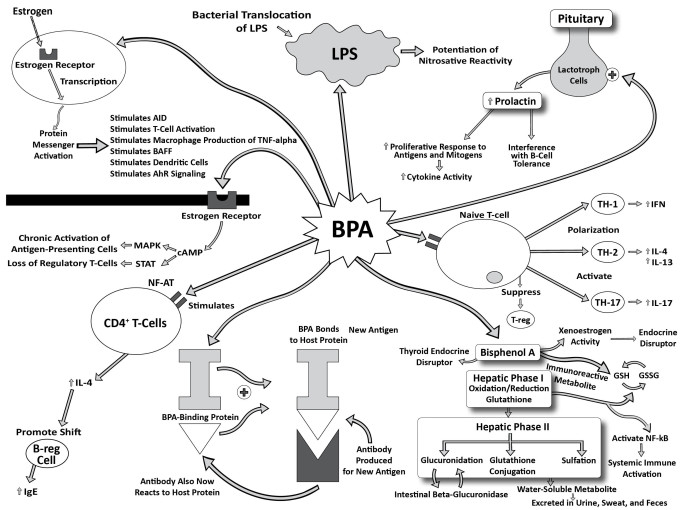If you are working with Hashimoto’s or another autoimmune disease, one goal is to avoid triggers that cause flare ups. Although avoiding dietary triggers with an anti-inflammatory diet — such as gluten, grains, dairy, GMOs, lectins — certain environmental chemicals can also cause flare ups.
One of the most common and overlooked thyroid autoimmune triggers is bisphenol-A (BPA). BPA is a chemical used in the production of polycarbonate plastics and epoxy resins such as plastic bottles and can liners. It is also found in store receipts and is absorbed into the bloodstream in just seconds of handling one.
For years BPA has also been known as an endocrine disruptor; it acts like estrogen in the body and has been linked to cancer, diabetes, obesity, infertility, brain, nervous system and cardiovascular abnormalities, and other health issues. With newer research showing its connection to autoimmunity, we have even more reason to avoid it.
BPA is found in many common items
There is much awareness about BPA in water bottles and cans, however BPA is also found in many daily items:
- CDs
- Toys
- Plastic dinnerware
- Some baby bottles
- Cash register receipts
- Lids for glass food and drink bottles
- Beer kegs
- Water supply lines
- Dental sealants and composites
- Medical devices
- PVC piping
- Currencies around the world
The Centers for Disease Control and Prevention reports detectable levels of BPA in 93% of subjects. If you have thyroid or neurological autoimmunity, you need to take your daily BPA exposure seriously.
Minimize your daily exposure to BPA
While we can't avoid BPA entirely in our environment, there is much we can do to minimize our daily exposure.
Use BPA-free products. Look for BPA-free labels; if a plastic isn't labeled, remember that some marked with code 3 or 7 may contain BPA.
Reduce consumption of canned foods. Most cans are lined with BPA-containing resins. When possible, buy fresh ingredients and make your own.
Avoid heating polycarbonate containers in the microwave or dishwasher. Exposed to heat, plastic can break down and release BPA into your food.
Avoid plastic coffee lids and paper cups. When your coffee or tea passes through the plastic lid, the heat and acidity leach BPA into the liquid. In addition, paper cups contain a thin, waterproof inner coating that contains small amounts of BPA. Ideally, brew your own coffee or tea and drink it from a glass or ceramic cup. If you must buy it to-go, bring your own ceramic cup, and if you must use the paper cup, forgo the plastic lid.
Avoid plastic bottles especially if they are heated or contain an acidic beverage such as soda or fruit juice. You should absolutely never drink an acidic beverage from a plastic bottle as you will be drinking high amounts of BPA.
Ideally, use alternatives to plastic. While manufacturers are eliminating BPA, many are now replacing BPA with bisphenol S (BPS) and other chemicals, and recent research shows this new approach may be equally risky. Therefore, when possible, use glass, ceramic, or stainless steel containers for storing and heating food. It's easy to cycle out your old plastic storage containers and use large glass jars or lidded glass or metal bowls.
The links between BPA exposure and autoimmunity
I recently published a scientific paper in the journal Autoimmune Disease reviewing every major immune pathway activated by BPA exposure and its links to autoimmunity. This is the first published paper that connects all the dots between BPA plastic products, its immune stimulating properties, and its potential to promote autoimmunity. I am currently researching specific environmental and dietary protein triggers for autoimmunity.
BPADiagramKharrazian.jpg

Dr. Datis Kharrazian
You can access the paper at this link: The Potential Roles of Bisphenol A (BPA) Pathogenesis in Autoimmunity.
Plastic products disrupt thyroid and hormone function
BPA is also a known thyroid and estrogen endocrine (hormone) disruptor.1 Endocrine disruptors are chemicals that bind to hormone receptors and impair hormone production, hormone receptor signaling, and gene expression. Researchers found that even trivial amounts of BPA exposure — lower than what’s found in infant blood samples — can impact both thyroid hormone production and receptor site responses.2 A 2011 survey of more than 1,500 adults and teens found an association between urinary phthalate (another compound found in plastics) and BPA concentrations and altered thyroid hormone levels.3
If you are looking for lifestyle choices that could improve thyroid function, reducing your exposure to plastics is an important step.
For more information visit the Dr. K. News website.
References
- Rochester JR. Bisphenol A and human health: a review of the literature. Reprod Toxicol. 2013 Dec;42:132-55.
- Gentilcore D, Porreca I, Rizzo F, Ganbaatar E, Carchia E, Mallardo M, De Felice M, Ambrosino C. Bisphenol A interferes with thyroid specific gene expression. Toxicology. 2013 Feb 8;304:21-31.
- Meeker JD, Ferguson KK. Relationship between urinary phthalate and bisphenol A concentrations and serum thyroid measures in U.S. adults and adolescents from the National Health and Nutrition Examination Survey (NHANES) 2007-2008. Environ Health Perspect. 2011 Oct;119(10):1396-402.
Originally published on Dr. K. News, July 27, 2014. Used with permission.



